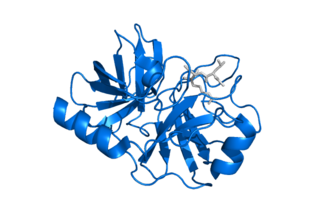Related Research Articles

Prostate-specific antigen (PSA), also known as gamma-seminoprotein or kallikrein-3 (KLK3), P-30 antigen, is a glycoprotein enzyme encoded in humans by the KLK3 gene. PSA is a member of the kallikrein-related peptidase family and is secreted by the epithelial cells of the prostate gland.

Prostatic acid phosphatase (PAP), also prostatic specific acid phosphatase (PSAP), is an enzyme produced by the prostate. It may be found in increased amounts in men who have prostate cancer or other diseases.
Kallikreins are a subgroup of serine proteases, enzymes capable of cleaving peptide bonds in proteins. In humans, plasma kallikrein has no known paralogue, while tissue kallikrein-related peptidases (KLKs) encode a family of fifteen closely related serine proteases. These genes are localised to chromosome 19q13, forming the largest contiguous cluster of proteases within the human genome. Kallikreins are responsible for the coordination of various physiological functions including blood pressure, semen liquefaction and skin desquamation.
Tissue kallikrein is an enzyme. This enzyme catalyses the following chemical reaction

Glutamate carboxypeptidase II (GCPII), also known as N-acetyl-L-aspartyl-L-glutamate peptidase I, NAAG peptidase, or prostate-specific membrane antigen (PSMA) is an enzyme that in humans is encoded by the FOLH1 gene. Human GCPII contains 750 amino acids and weighs approximately 84 kDa.

Kallikrein-1 is a protein that in humans is encoded by the KLK1 gene. KLK1 is a member of the peptidase S1 family.

Kallikrein-2 is a protein that in humans is encoded by the KLK2 gene, and is particularly associated with prostatic tissue.

Aldo-keto reductase family 1 member C3 (AKR1C3), also known as 17β-hydroxysteroid dehydrogenase type 5 is a key steroidogenic enzyme that in humans is encoded by the AKR1C3 gene.

Semenogelin-1 is a protein that in humans is encoded by the SEMG1 gene. The protein encoded by this gene is the predominant protein in semen. The encoded secreted protein is involved in the formation of a gel matrix that encases ejaculated spermatozoa. The prostate-specific antigen (PSA) protease processes this protein into smaller peptides, with each possibly having a separate function. The proteolysis process breaks down the gel matrix and allows the spermatozoa to move more freely. Two transcript variants encoding different isoforms have been found for this gene.

Gamma-enolase, also known as enolase 2 (ENO2) or neuron specific enolase (NSE), is an enzyme that in humans is encoded by the ENO2 gene. Gamma-enolase is a phosphopyruvate hydratase.

Kallikrein-6 is a protein that in humans is encoded by the KLK6 gene. Kallikrein-6 is also referred to as neurosin, protease M, hK6, or zyme. It is a 223 amino acid sequence, derived from its 244 original form, which contains a 16 residue presignal and 5 residue activation peptide.

Kallikrein-5, formerly known as stratum corneum tryptic enzyme (SCTE), is a serine protease expressed in the epidermis. In humans it is encoded by the KLK5 gene. This gene is one of the fifteen kallikrein subfamily members located in a cluster on chromosome 19. Its expression is up-regulated by estrogens and progestins. Alternative splicing results in multiple transcript variants encoding the same protein.

Kallikrein-related peptidase 4 is a protein which in humans is encoded by the KLK4 gene.

Kallikrein-11 is a protein that in humans is encoded by the KLK11 gene.

Semenogelin-2 is a protein that in humans is encoded by the SEMG2 gene.

Serpin B6 is a protein that in humans is encoded by the SERPINB6 gene.

3α-Hydroxysteroid dehydrogenase is an enzyme that in humans is encoded by the AKR1C4 gene. It is known to be necessary for the synthesis of the endogenous neurosteroids allopregnanolone, THDOC, and 3α-androstanediol. It is also known to catalyze the reversible conversion of 3α-androstanediol (5α-androstane-3α,17β-diol) to dihydrotestosterone and vice versa.

SAM pointed domain-containing Ets transcription factor is a protein that in humans is encoded by the SPDEF gene.

Kallikrein-15 is a protein that in humans is encoded by the KLK15 gene.

Gamma-glutamyltransferase 1 (GGT1), also known as CD224, is a human gene.
References
- ↑ Digby M, Zhang XY, Richards RI (March 1989). "Human prostate specific antigen (PSA) gene: structure and linkage to the kallikrein-like gene, hGK-1". Nucleic Acids Research. 17 (5): 2137. doi:10.1093/nar/17.5.2137. PMC 317563 . PMID 2467258.
- ↑ Christensson A, Laurell CB, Lilja H (December 1990). "Enzymatic activity of prostate-specific antigen and its reactions with extracellular serine proteinase inhibitors". European Journal of Biochemistry. 194 (3): 755–63. doi: 10.1111/j.1432-1033.1990.tb19466.x . PMID 1702714.